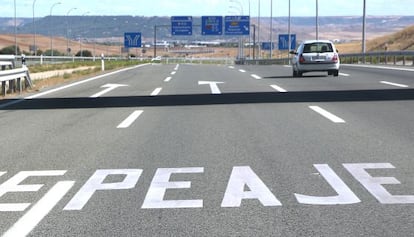Bankruptcy-threatened toll road operators offered government bailout
Public Works and Finance ministries want to group nine highways in one state-owned company Proposal would see 50 percent of concession holders' debt canceled

The government is rushing to close a deal with struggling toll road operators and their creditors in order to prevent their total bankruptcy.
The latest proposal by the Public Works and Finance ministries involves creating a 100-percent state-owned company to bring together nine toll roads after forgiving 50 percent of their debt, of which over €3.9 billion is owed to banks and another €500 million to construction companies, sources familiar with the situation said.
The offer was discussed on Tuesday by representatives of the lenders and the builders at a meeting that featured the surprise presence of Public Works Minister Ana Pastor.
The banks, which by law have already provisioned 50 percent of the credit they extended to the concession holders, have until Monday to give the executive an answer. If the proposal is accepted, it will represent a significant step forward in avoiding the collapse of the highway operators.
The operators owe €3.9 billion to the banks and another €500 million to construction firms
Under the deal, creditors would receive a negotiable 30-year bond with a minimum yield of one percent. This interest would rise if toll road traffic picks up. Financial sources said the lenders would try to negotiate a hike in this yield to bring it closer to Finance Ministry bond market-value returns.
The state would take responsibility for €2.4 billion in debt, which includes the cost of extending the maturities. The state highway corporation would also be burdened with the debt owed to the owners of expropriated land, which could be anywhere between €1.2 and €1.8 billion, according to La Vanguardia newspaper.
An initial proposal to leave 20 percent of the company in private hands was discarded out of fear that Brussels would consider it state aid to the private sector.
The money used to bail out the highway operators would not count as part of the public deficit because it does not constitute a single, immediate payment. Neither would it be considered state debt because it is attributed to a public corporation. Yet the state will still have to pay the creditors with taxpayer money and with what little is made from toll road users.
The new corporation will bring together at least nine concession holders, which together own 748 kilometers of toll roads – over a fifth of the country’s entire turnpike network. They include the radial toll roads around Madrid and the Madrid-Barajas, Madrid-Toledo, Ocaña-La Roda, Cartagena-Vera highways, as well as the beltway around Alicante.
These highways are in administration due to the cost overruns of land expropriation, which were not balanced out by road traffic. If the state allowed the concession holders to go bankrupt, it would have to take on 100 percent of their debt.
Tu suscripción se está usando en otro dispositivo
¿Quieres añadir otro usuario a tu suscripción?
Si continúas leyendo en este dispositivo, no se podrá leer en el otro.
FlechaTu suscripción se está usando en otro dispositivo y solo puedes acceder a EL PAÍS desde un dispositivo a la vez.
Si quieres compartir tu cuenta, cambia tu suscripción a la modalidad Premium, así podrás añadir otro usuario. Cada uno accederá con su propia cuenta de email, lo que os permitirá personalizar vuestra experiencia en EL PAÍS.
¿Tienes una suscripción de empresa? Accede aquí para contratar más cuentas.
En el caso de no saber quién está usando tu cuenta, te recomendamos cambiar tu contraseña aquí.
Si decides continuar compartiendo tu cuenta, este mensaje se mostrará en tu dispositivo y en el de la otra persona que está usando tu cuenta de forma indefinida, afectando a tu experiencia de lectura. Puedes consultar aquí los términos y condiciones de la suscripción digital.








































